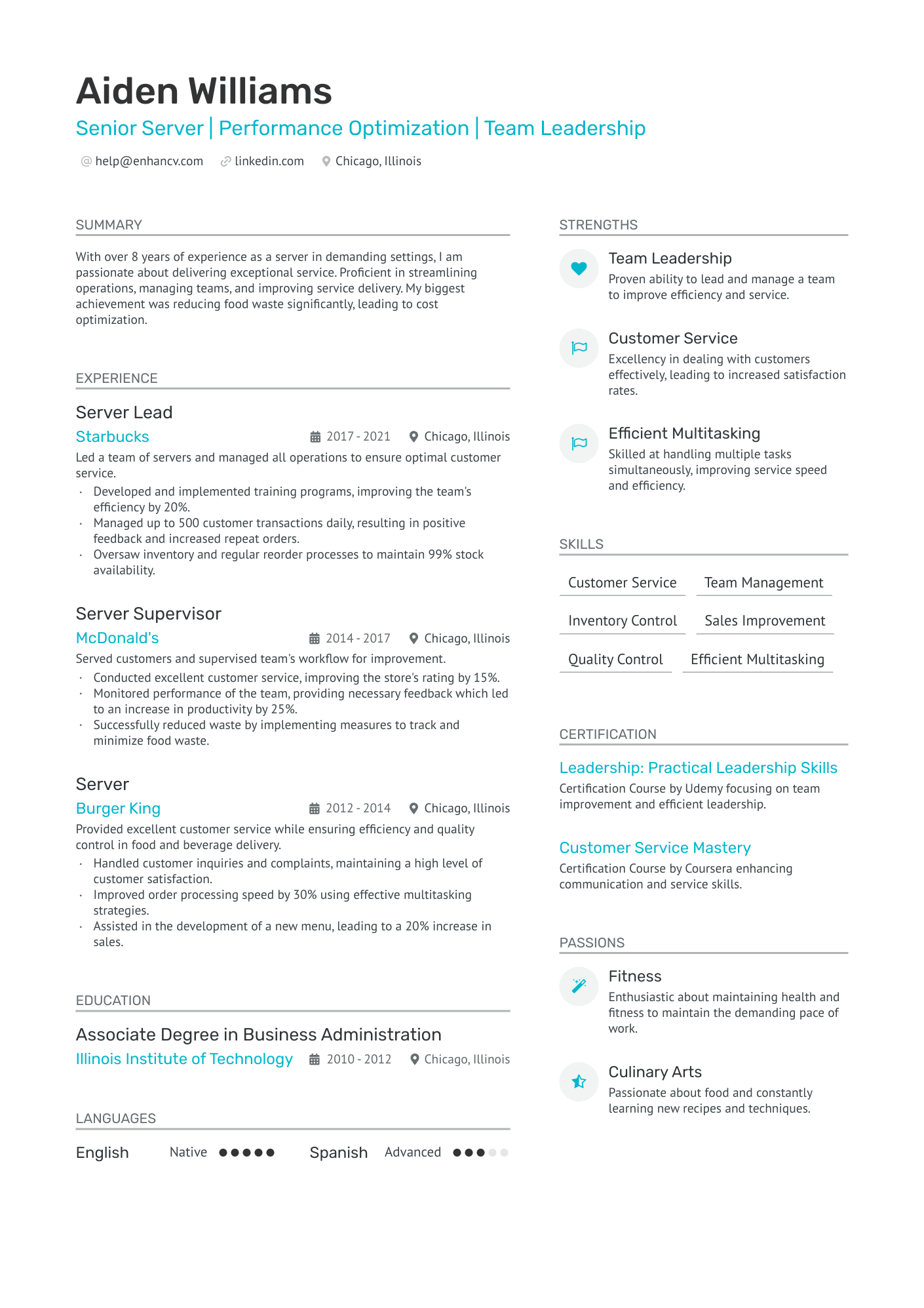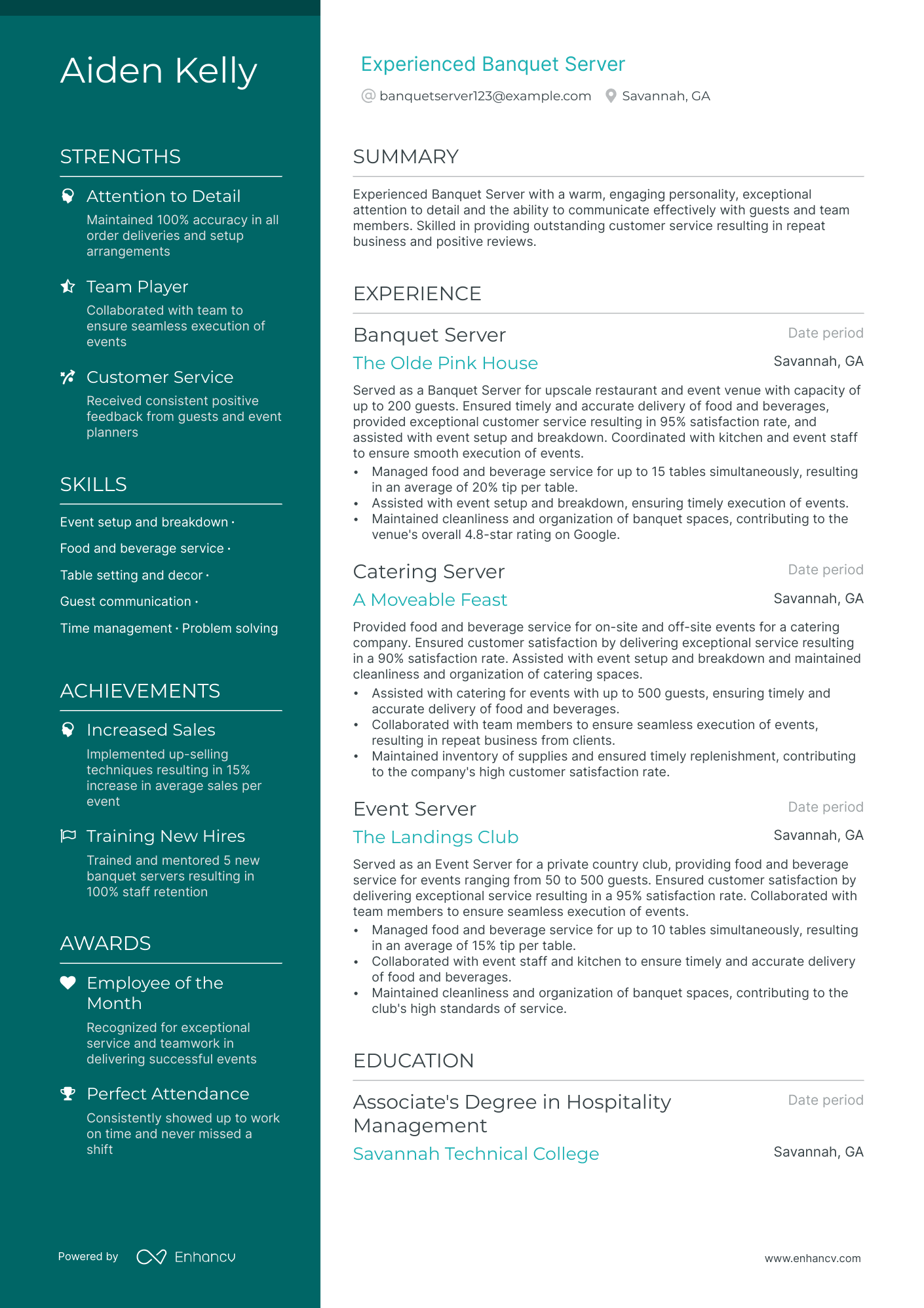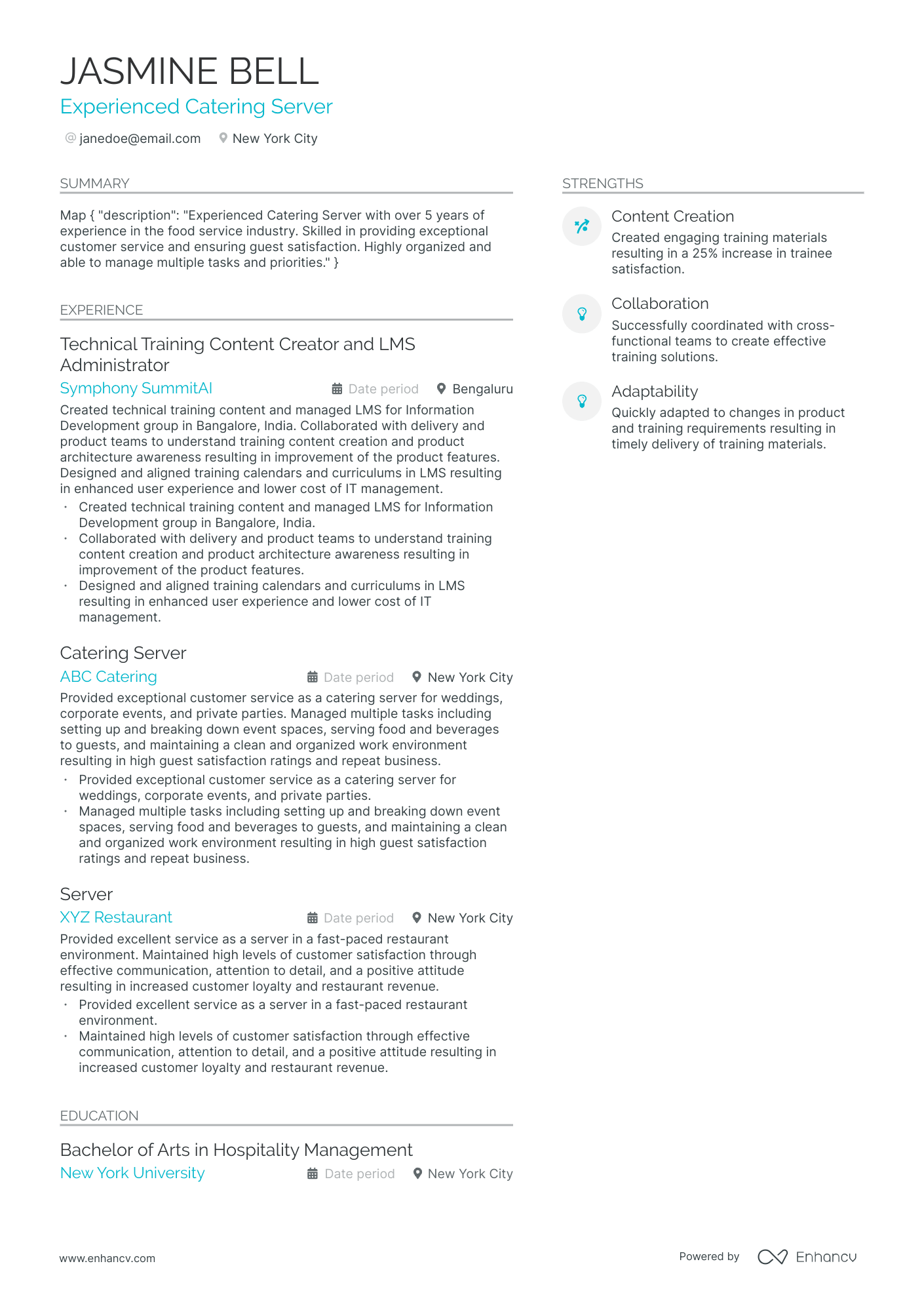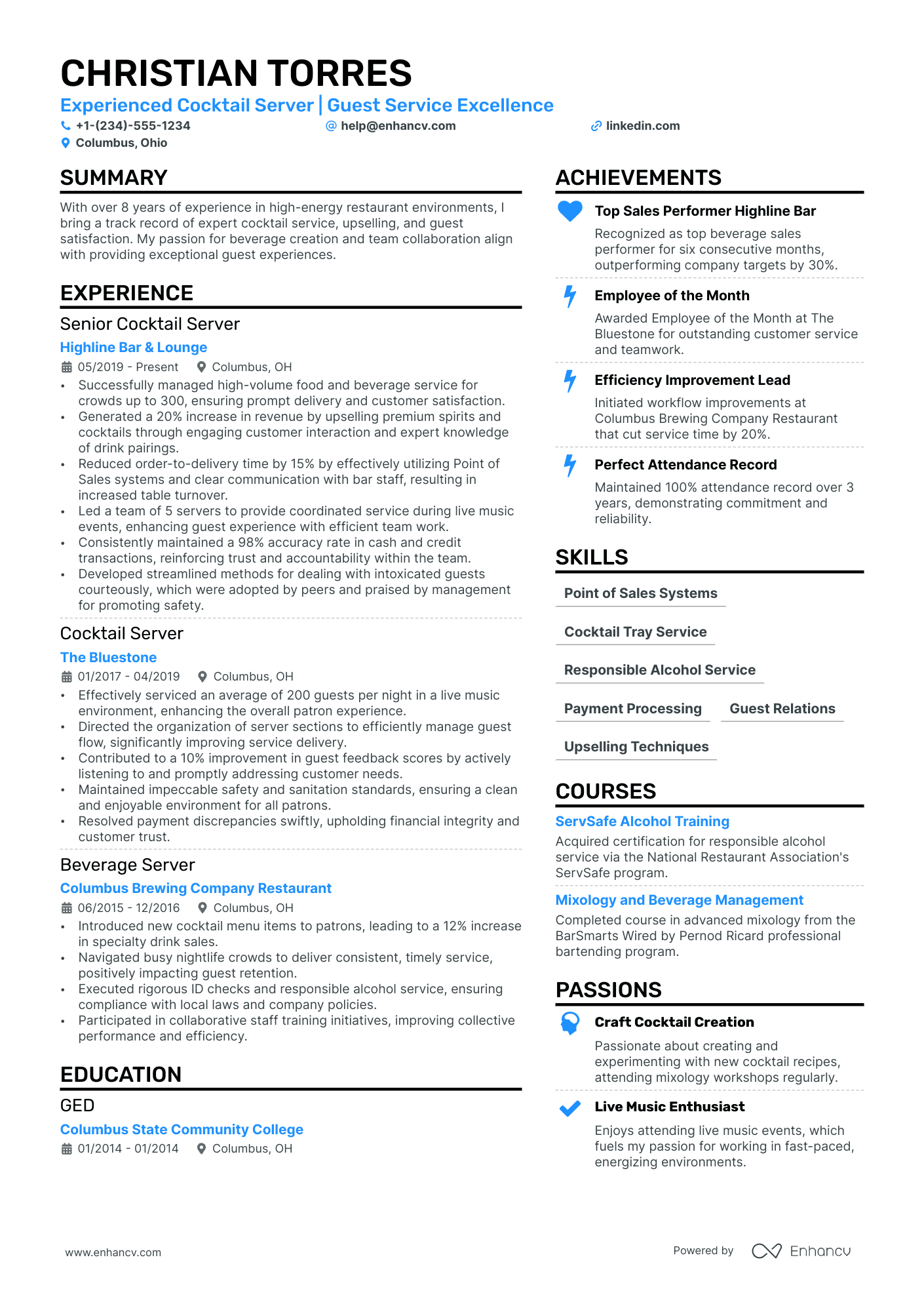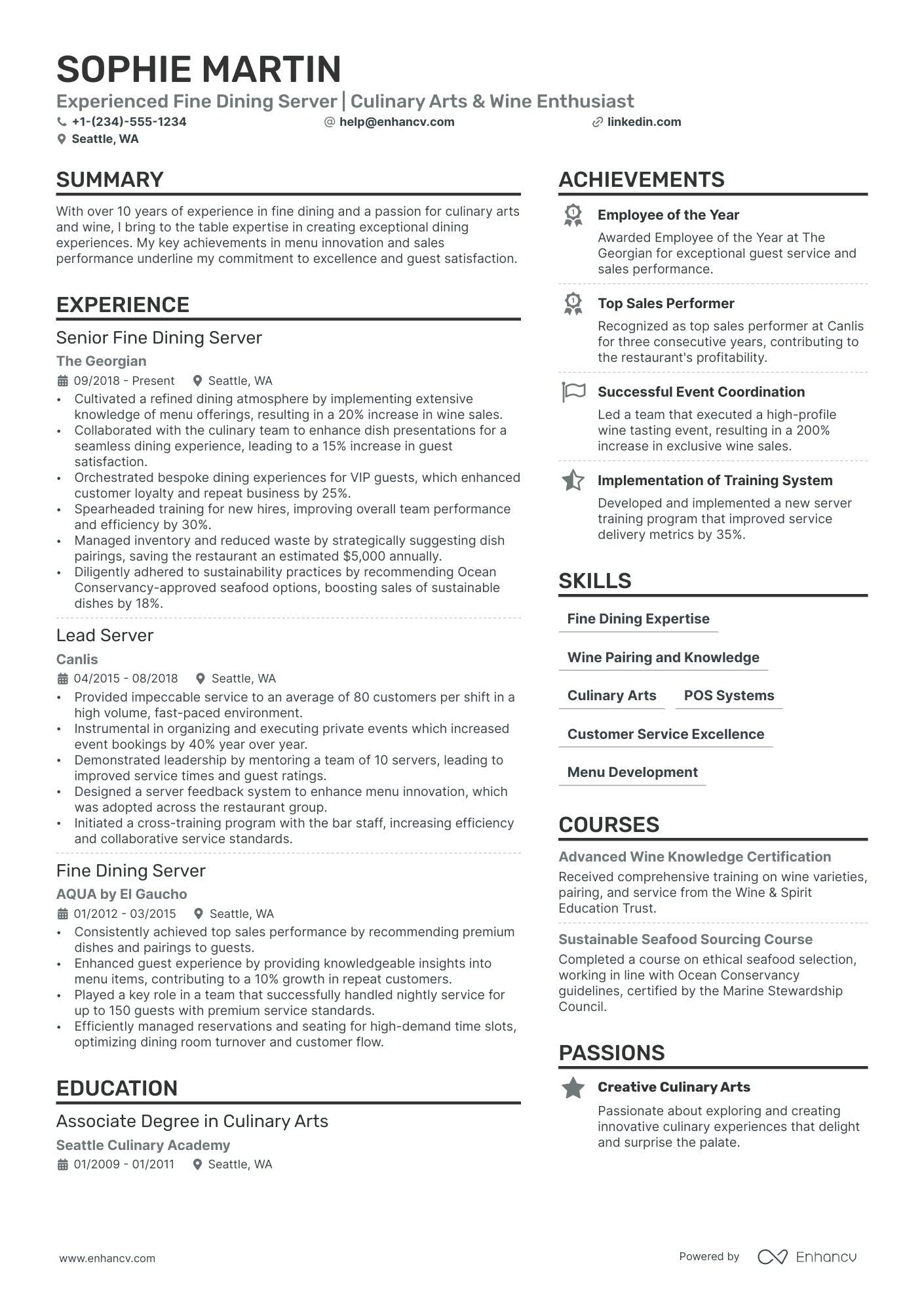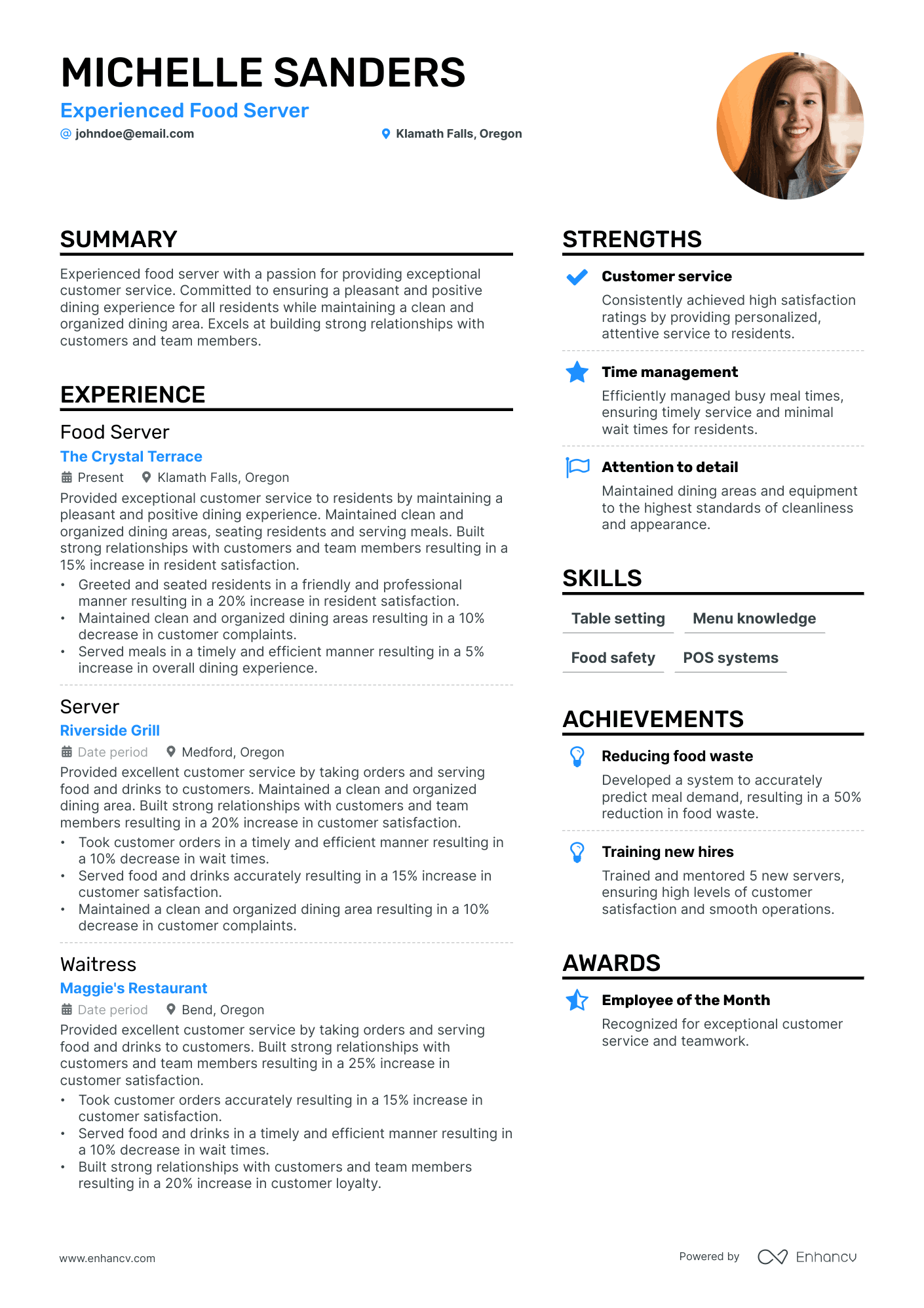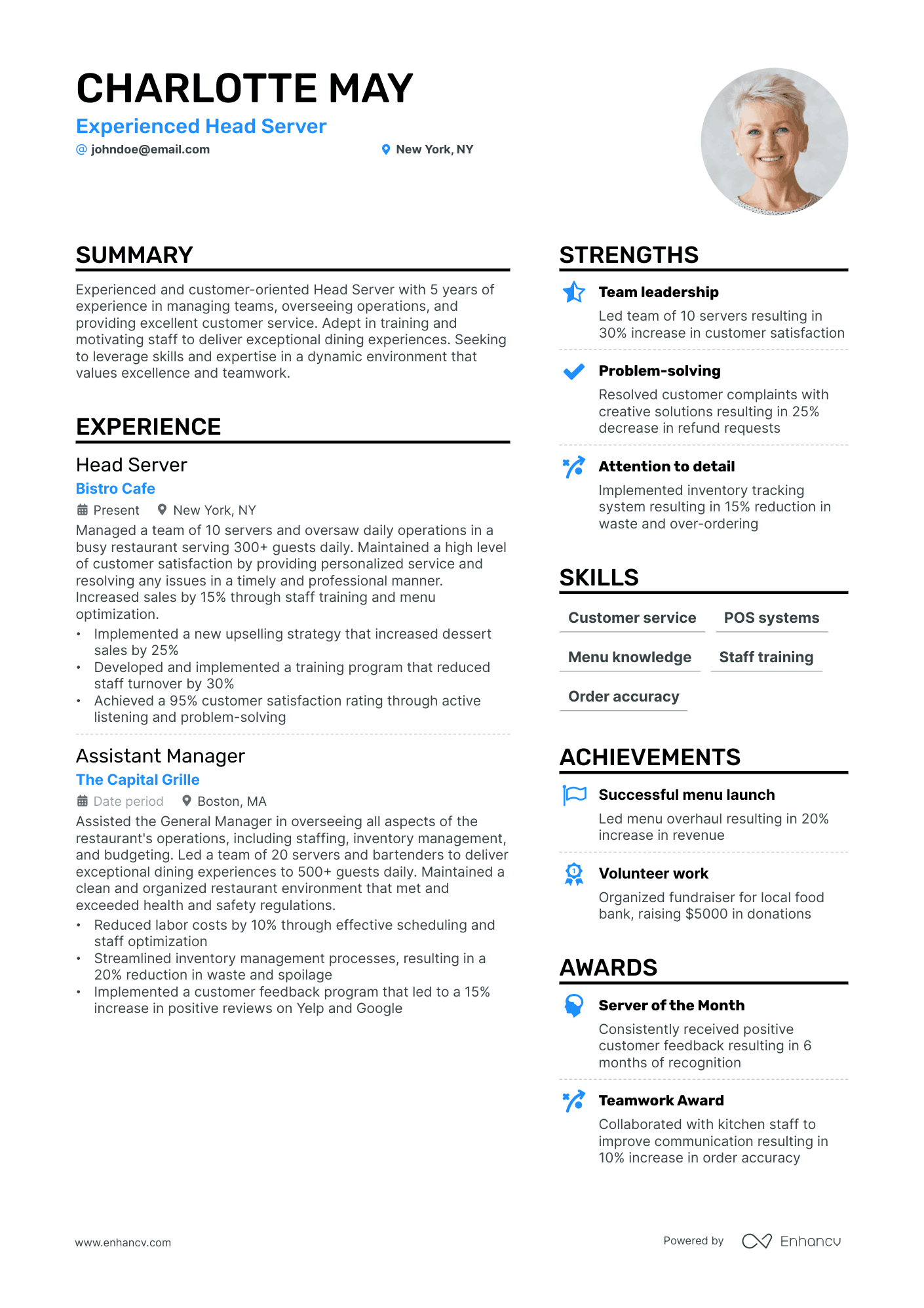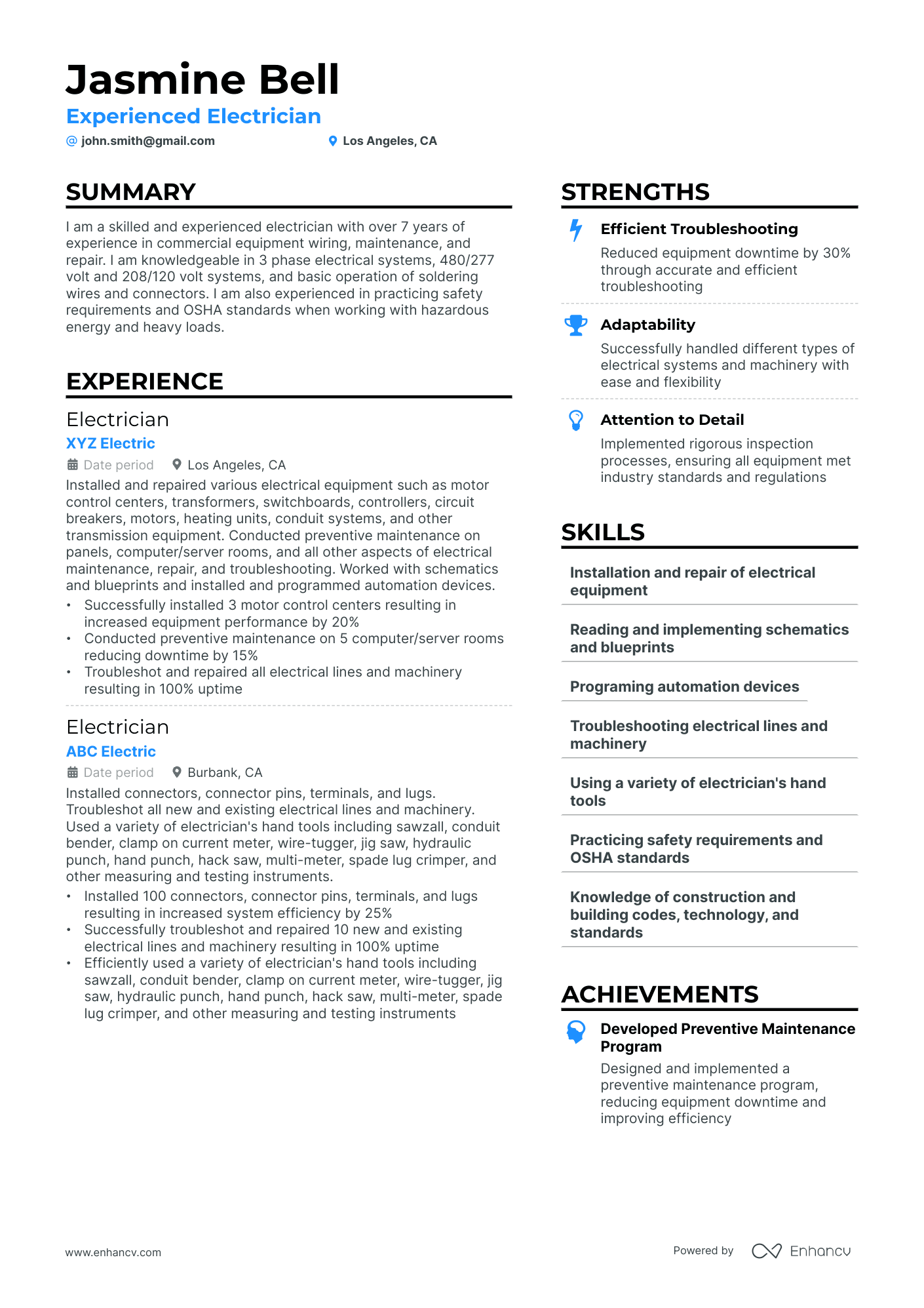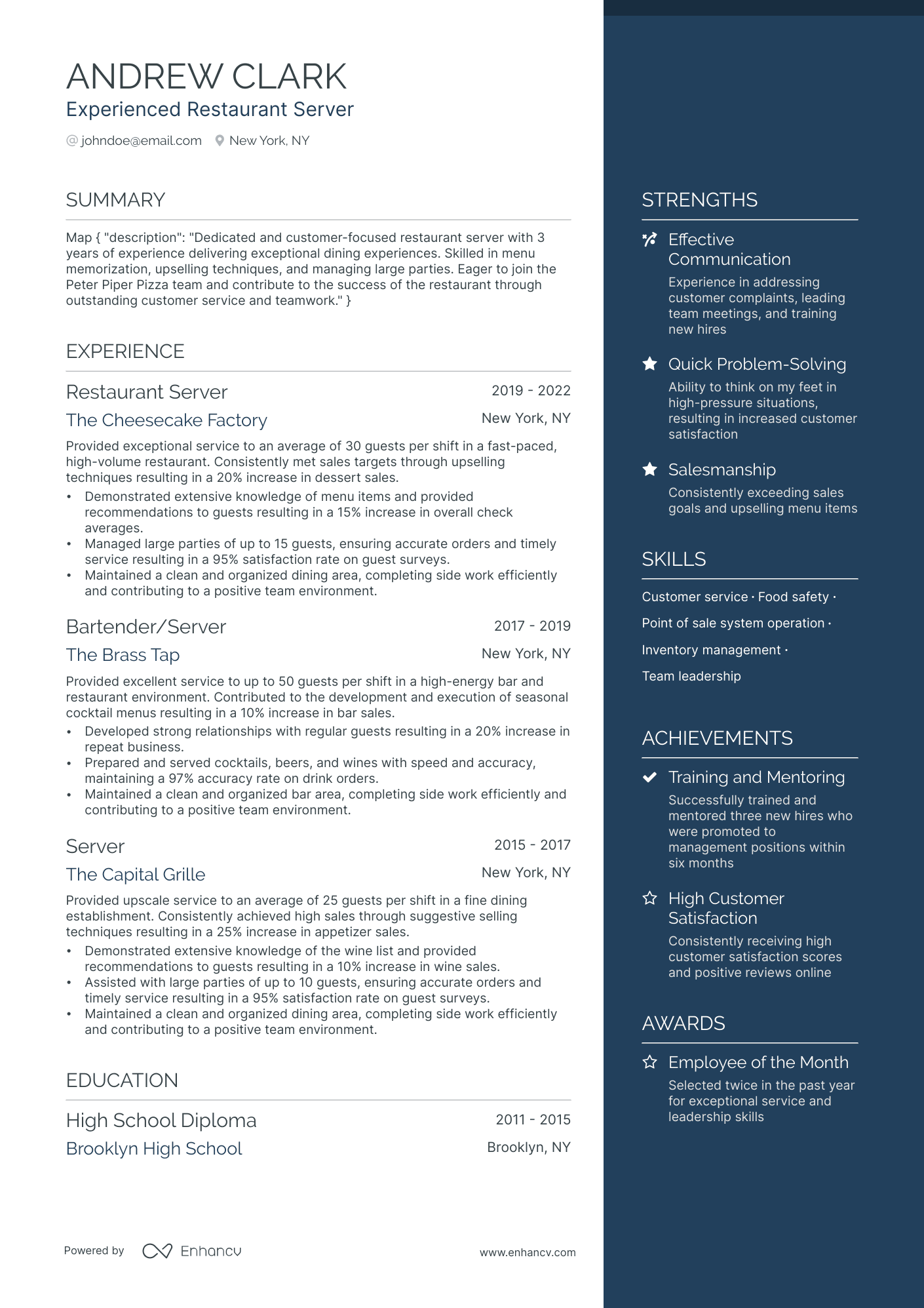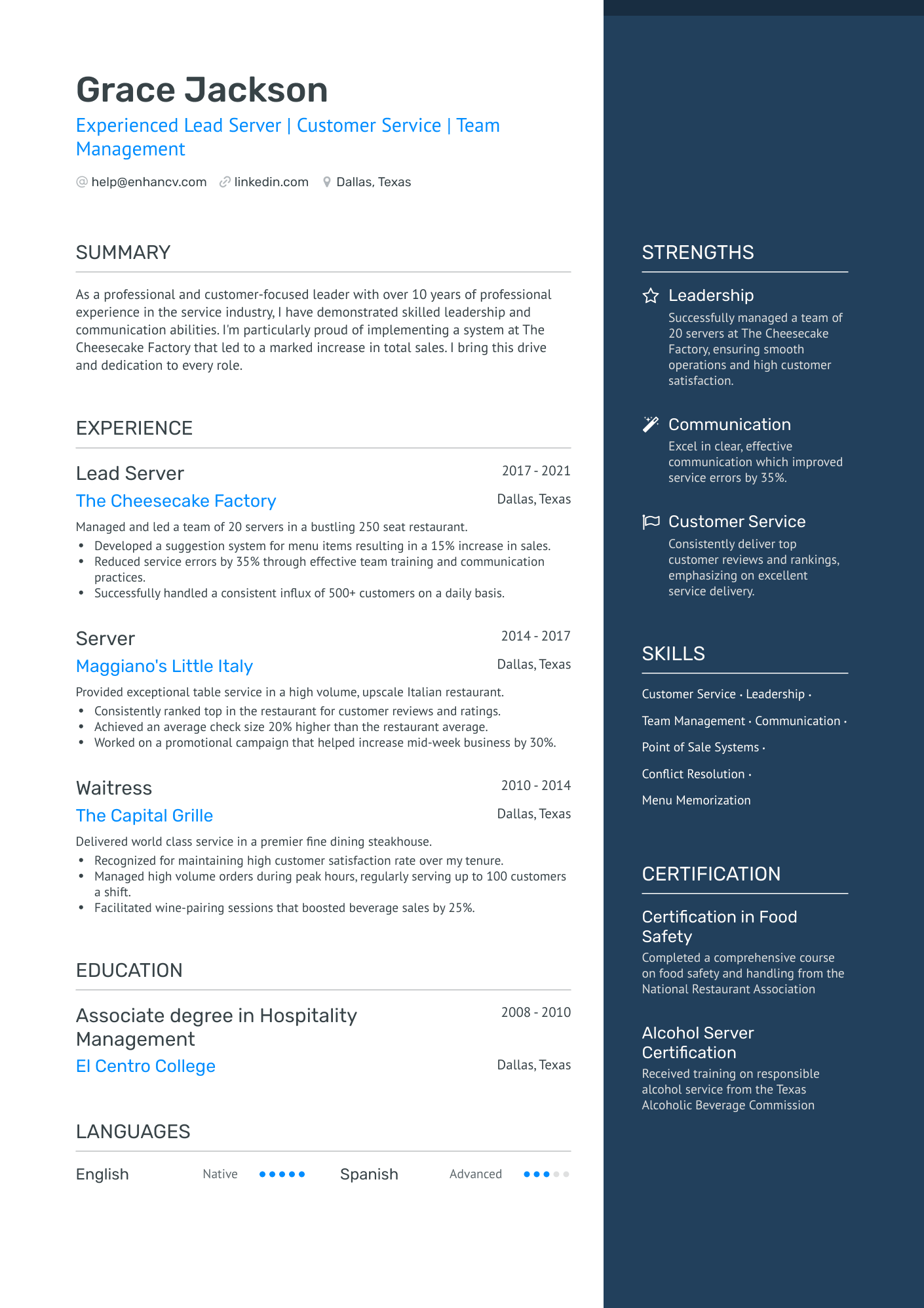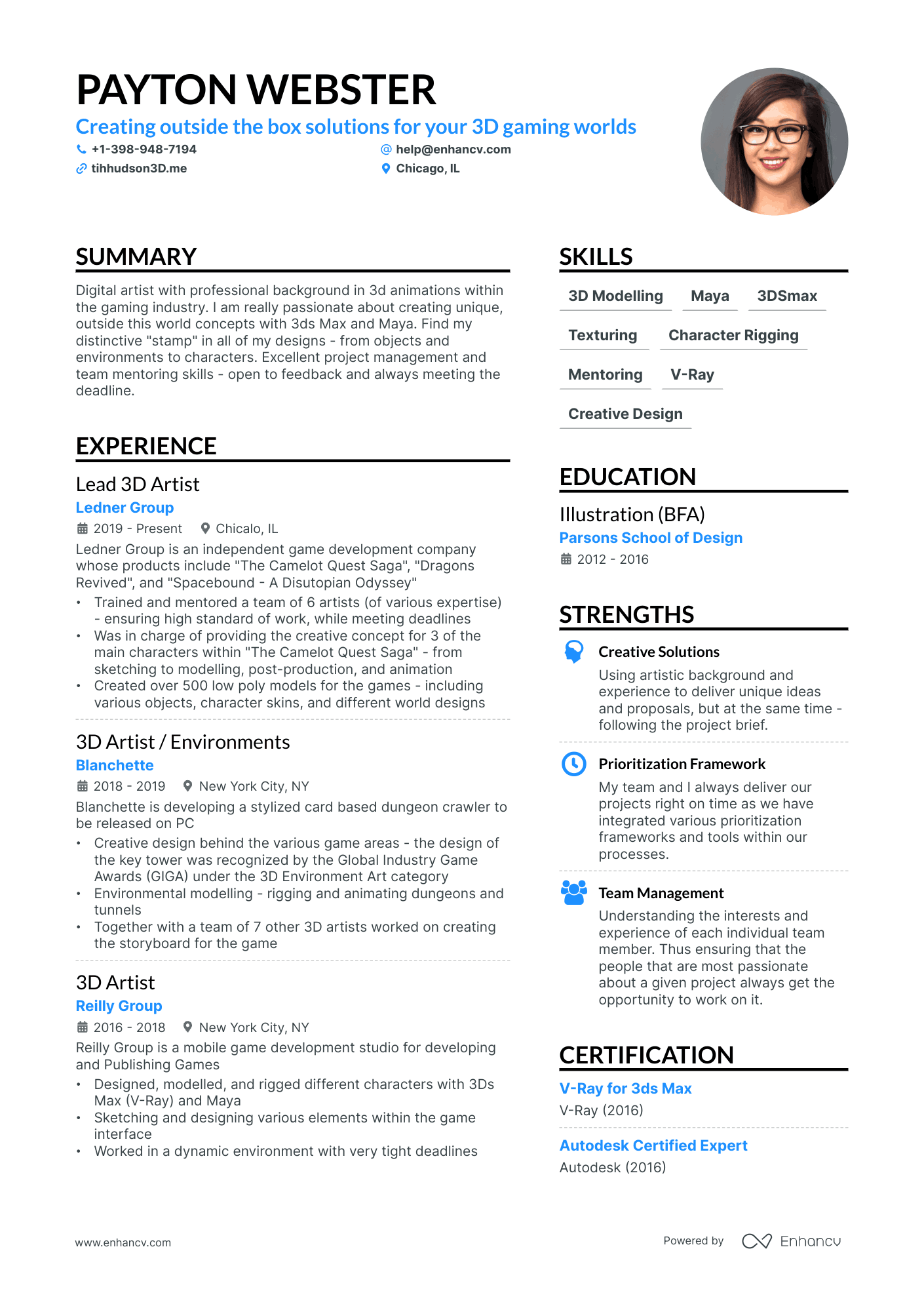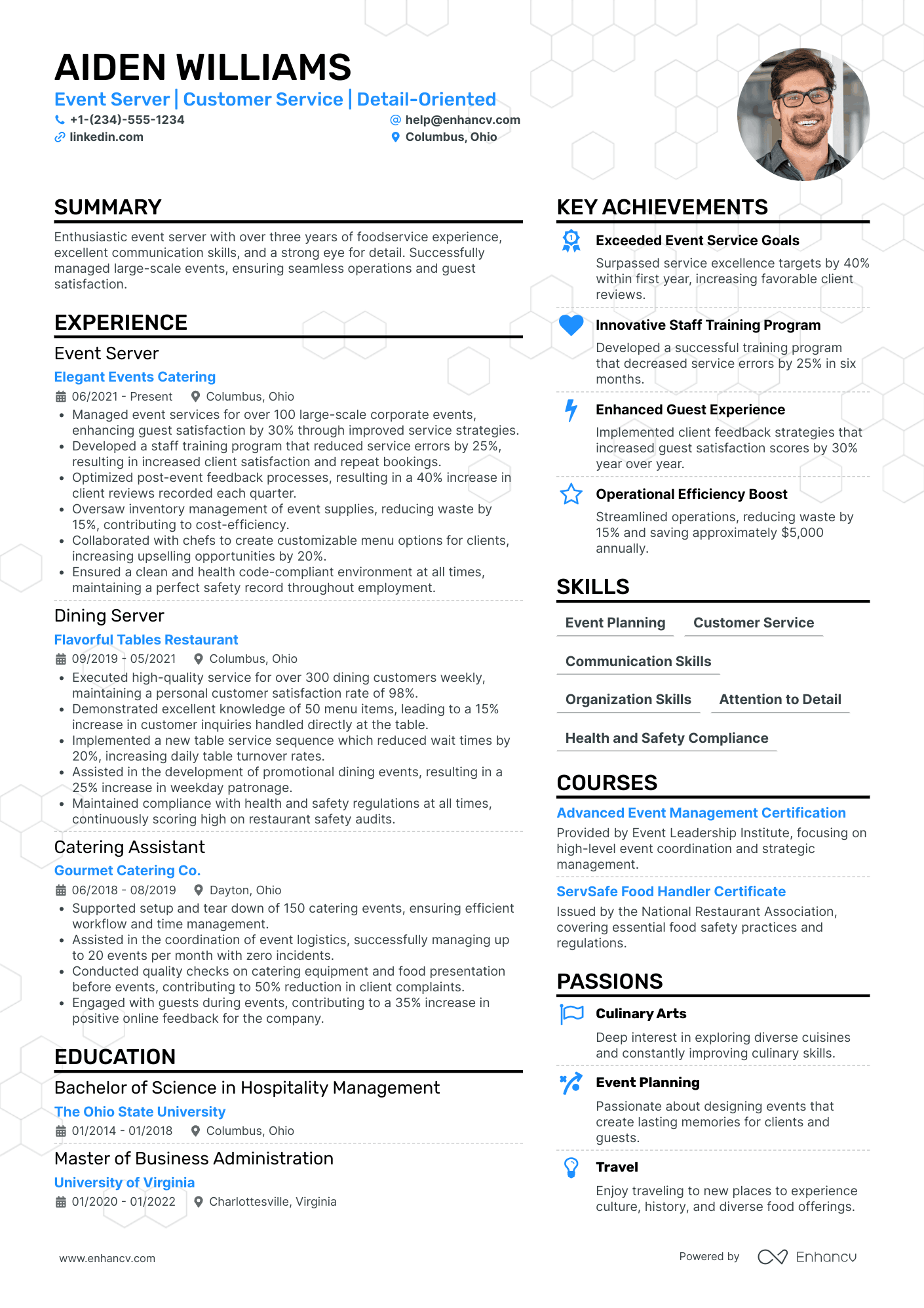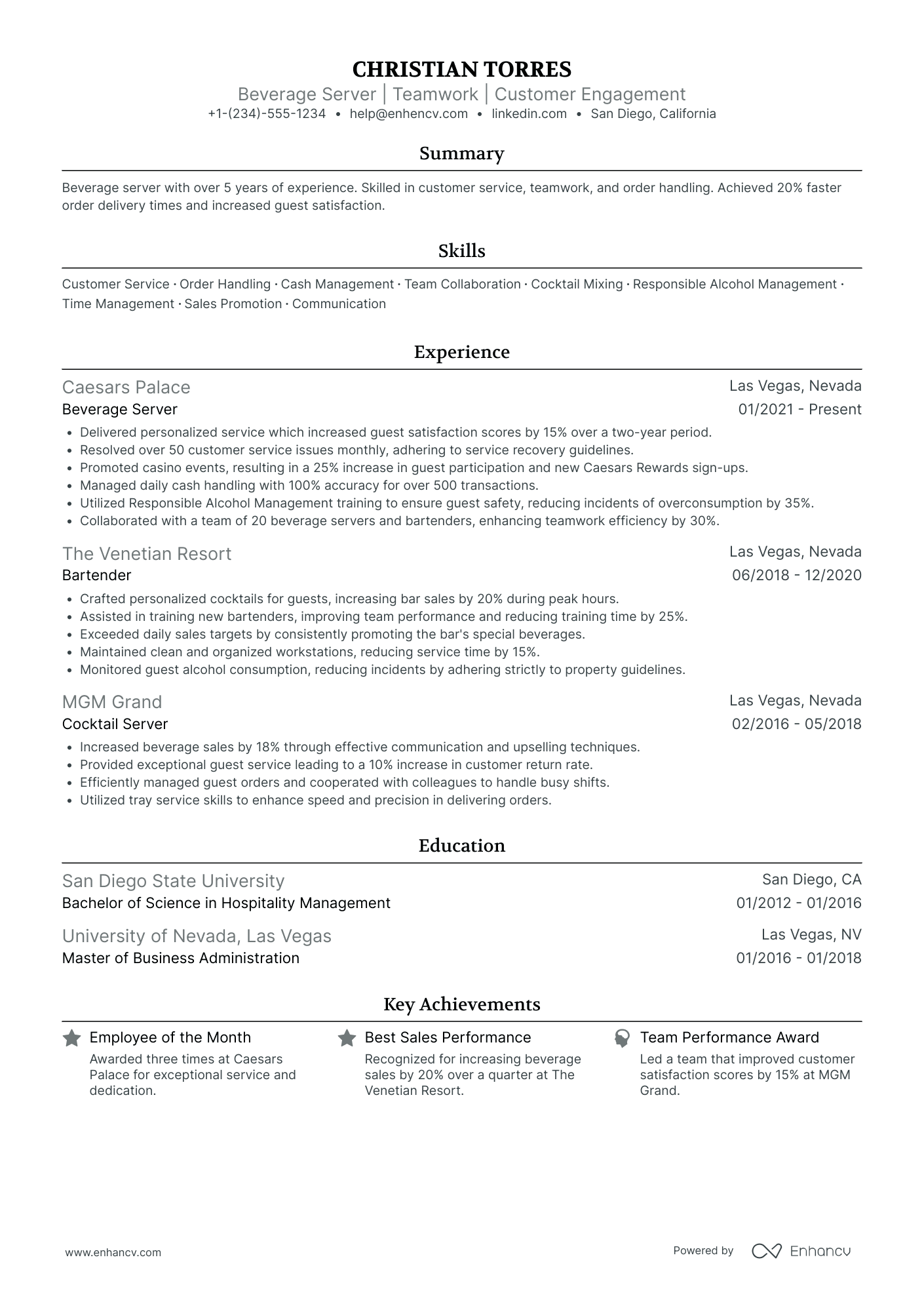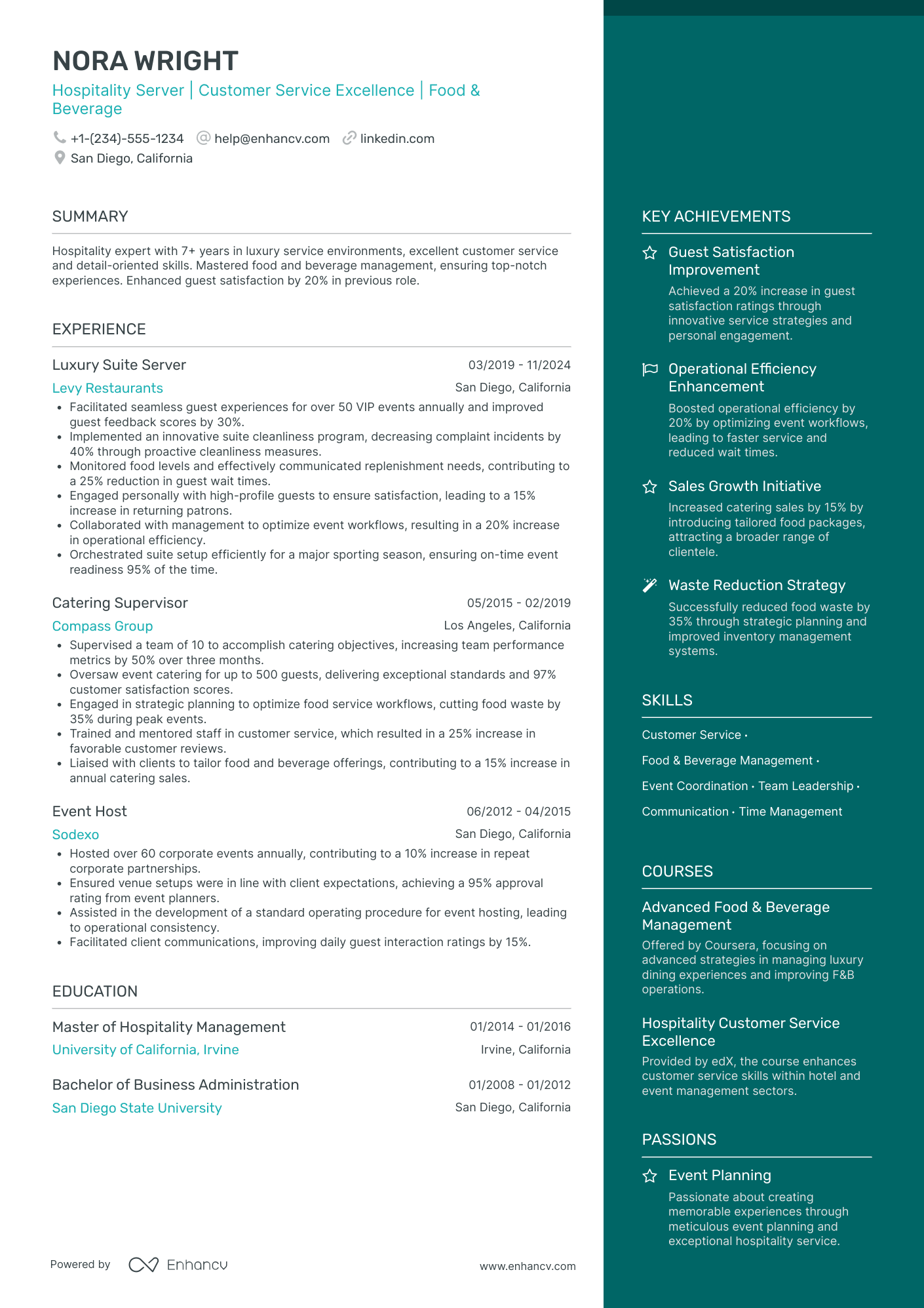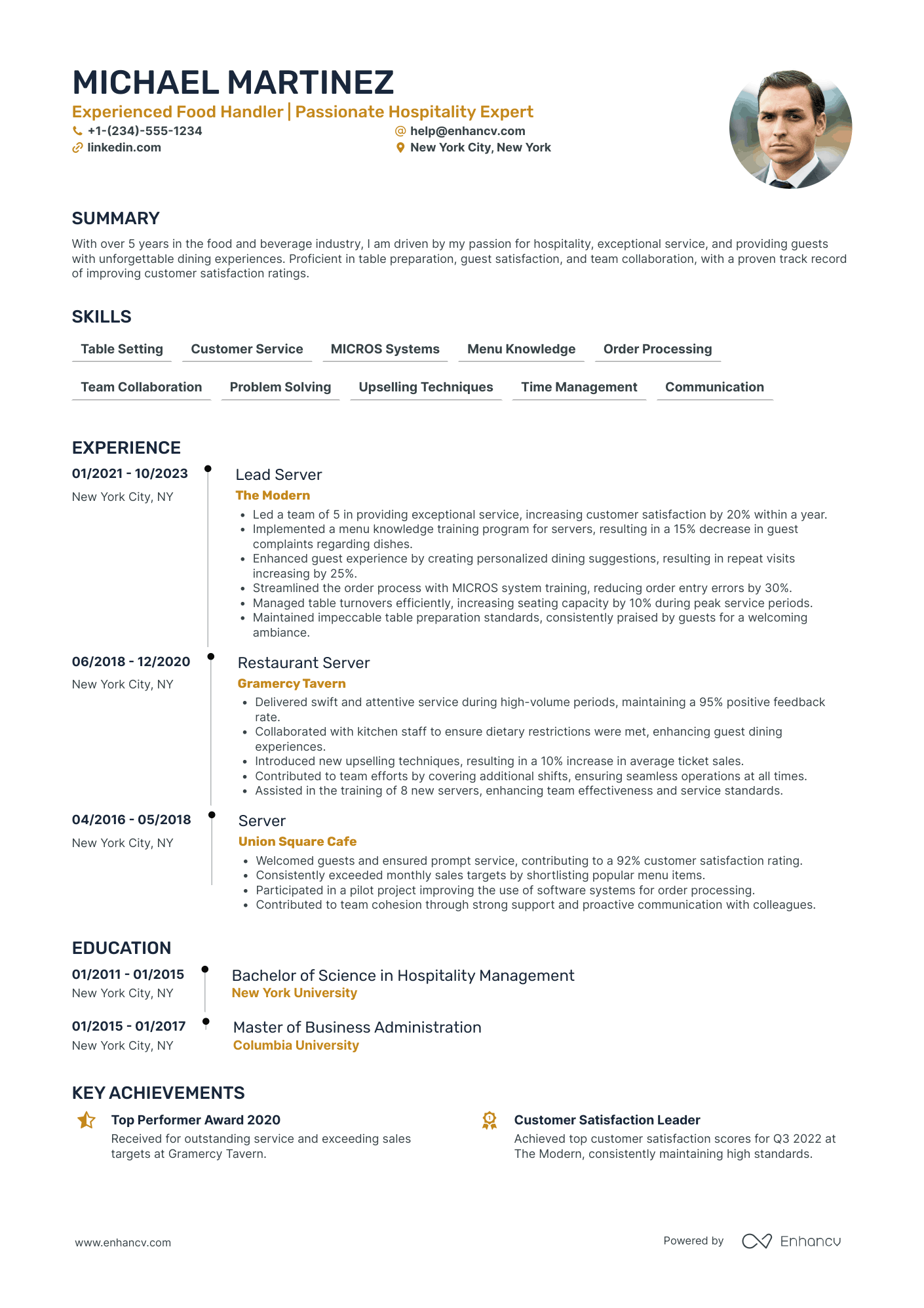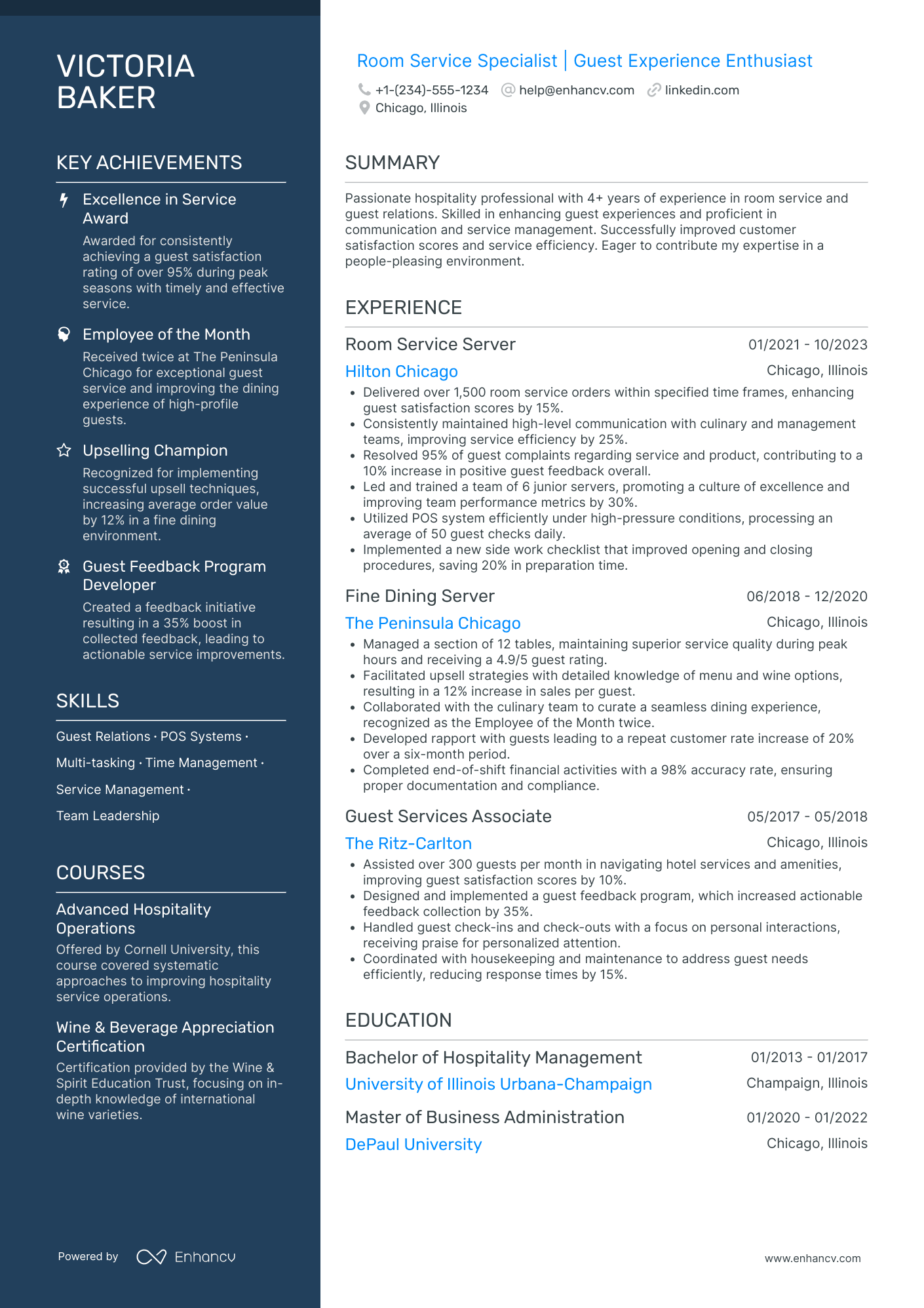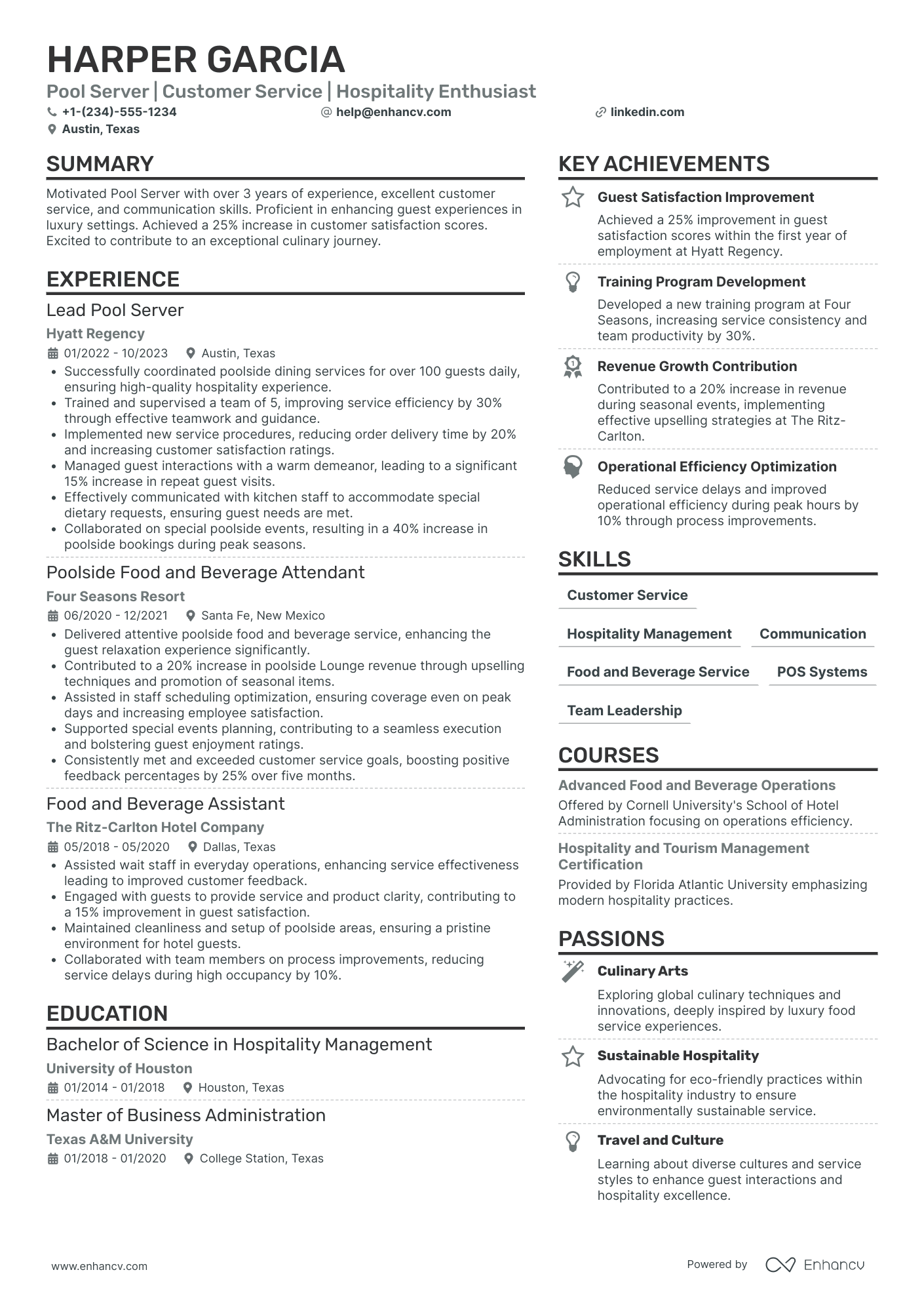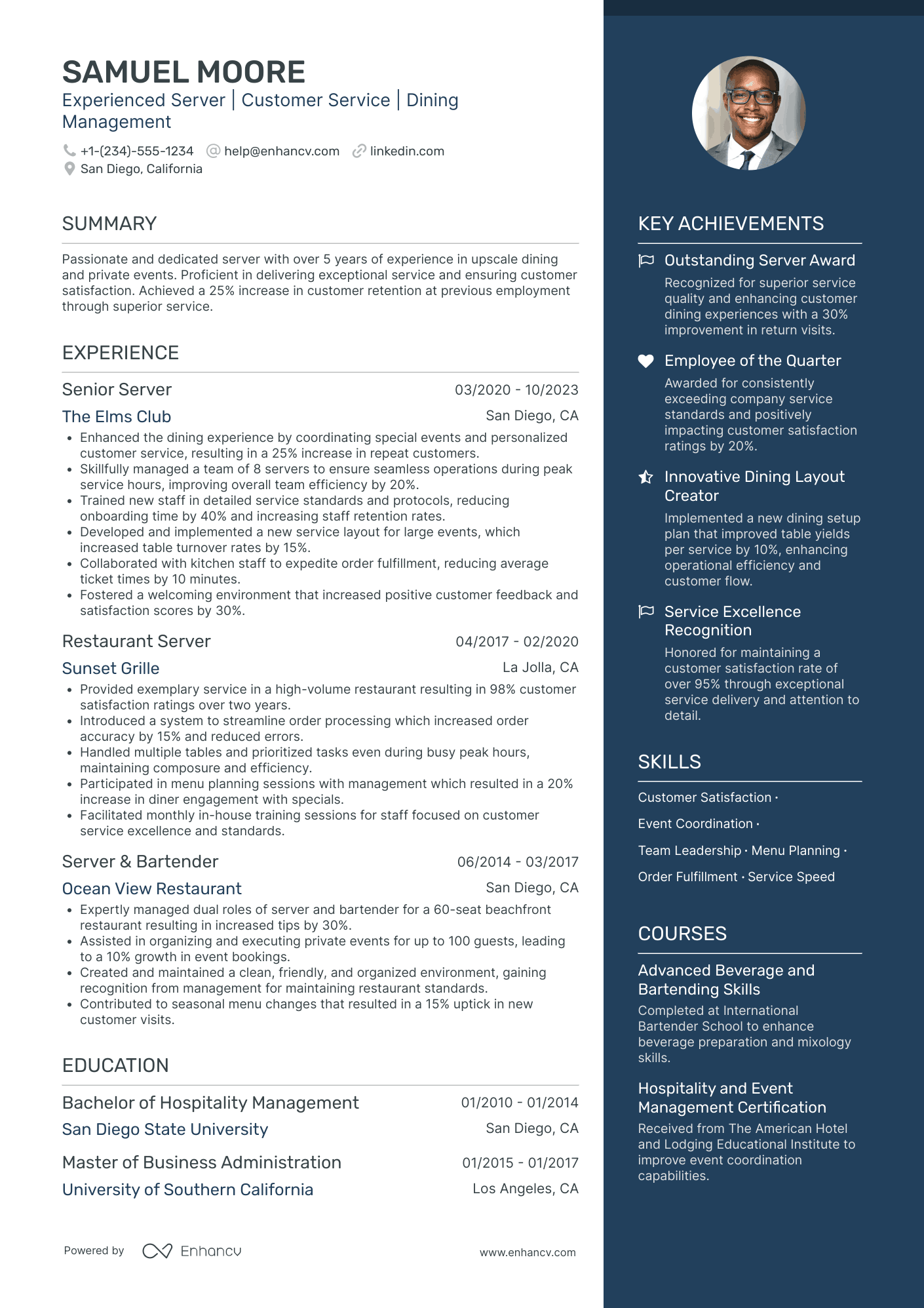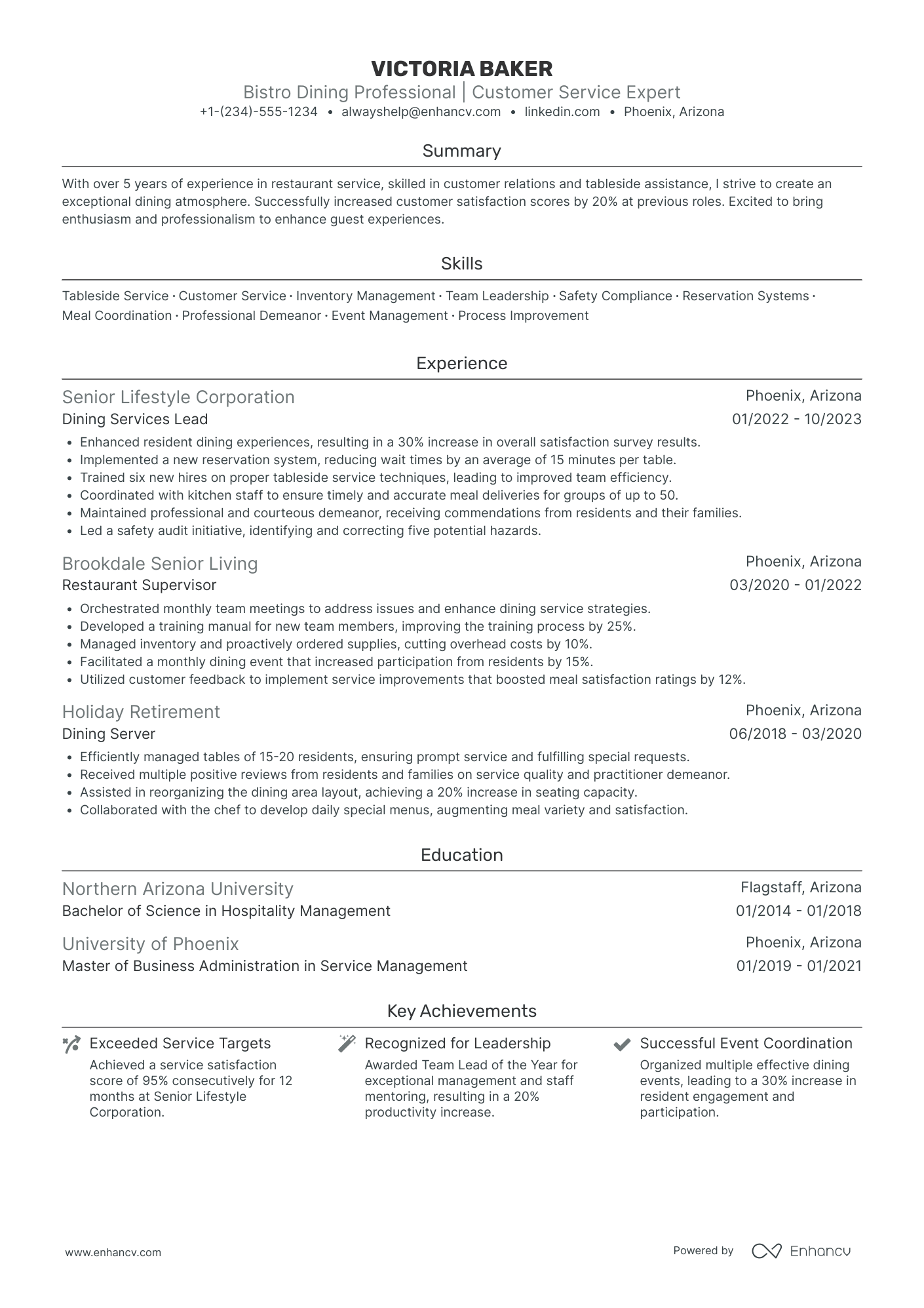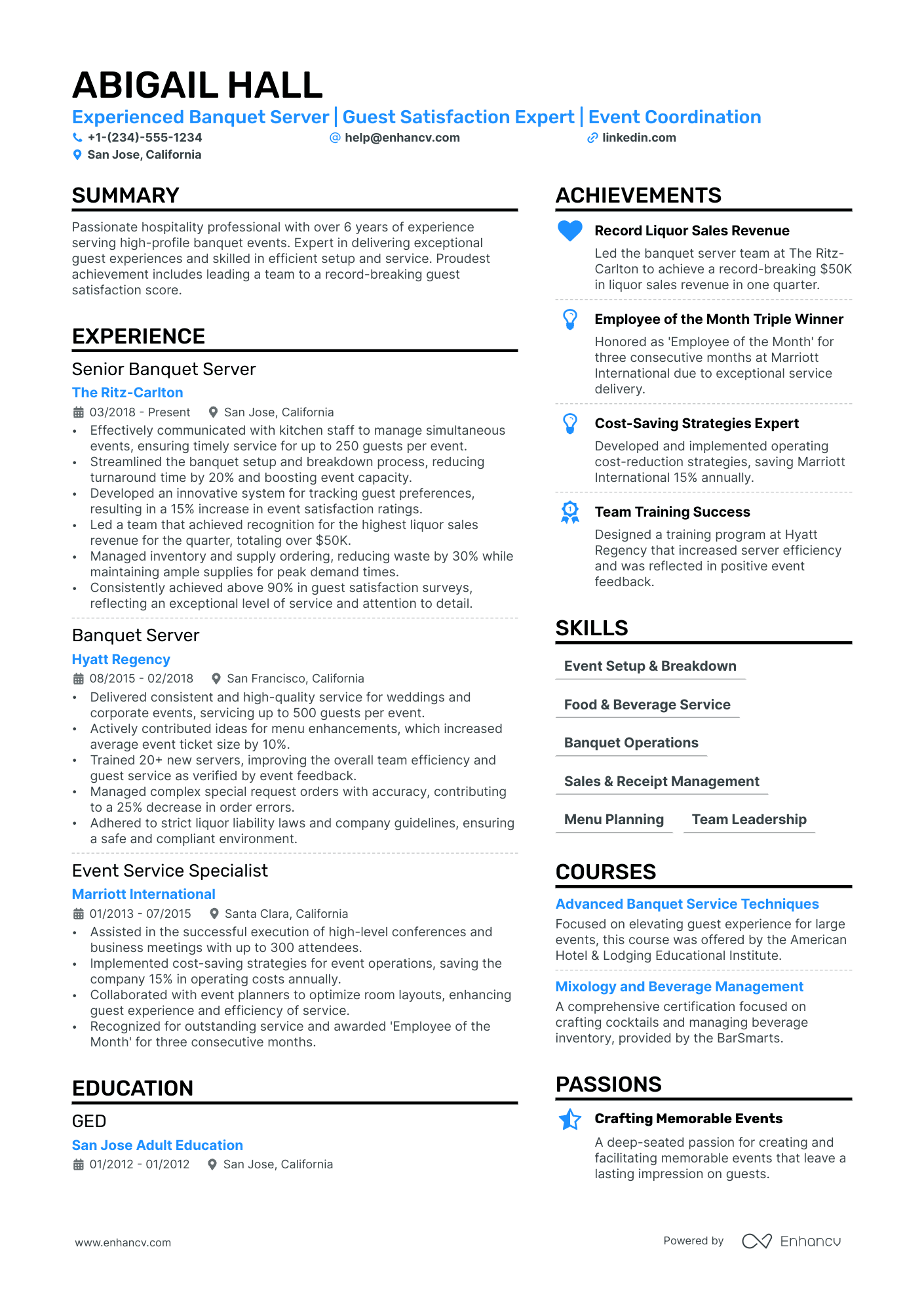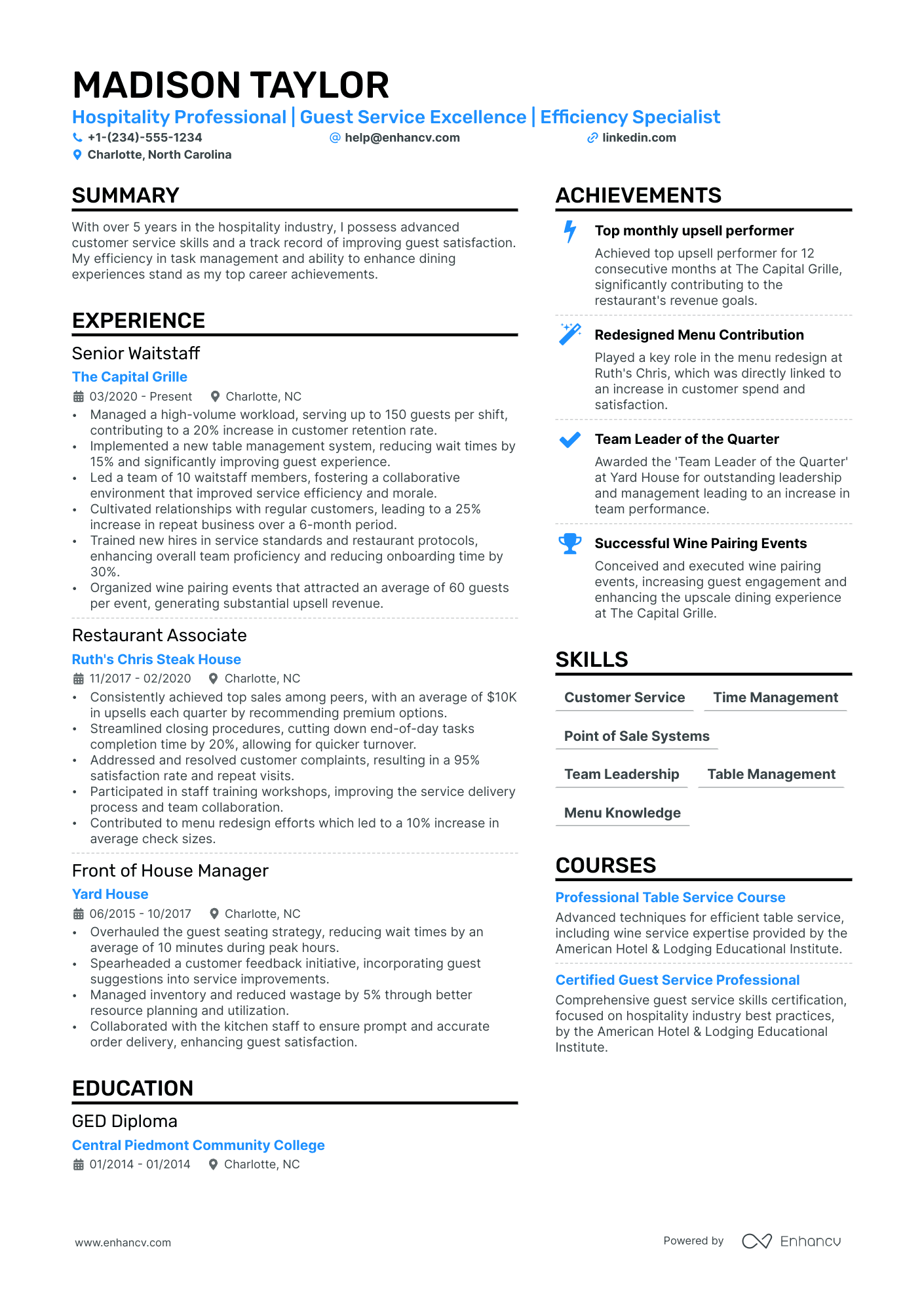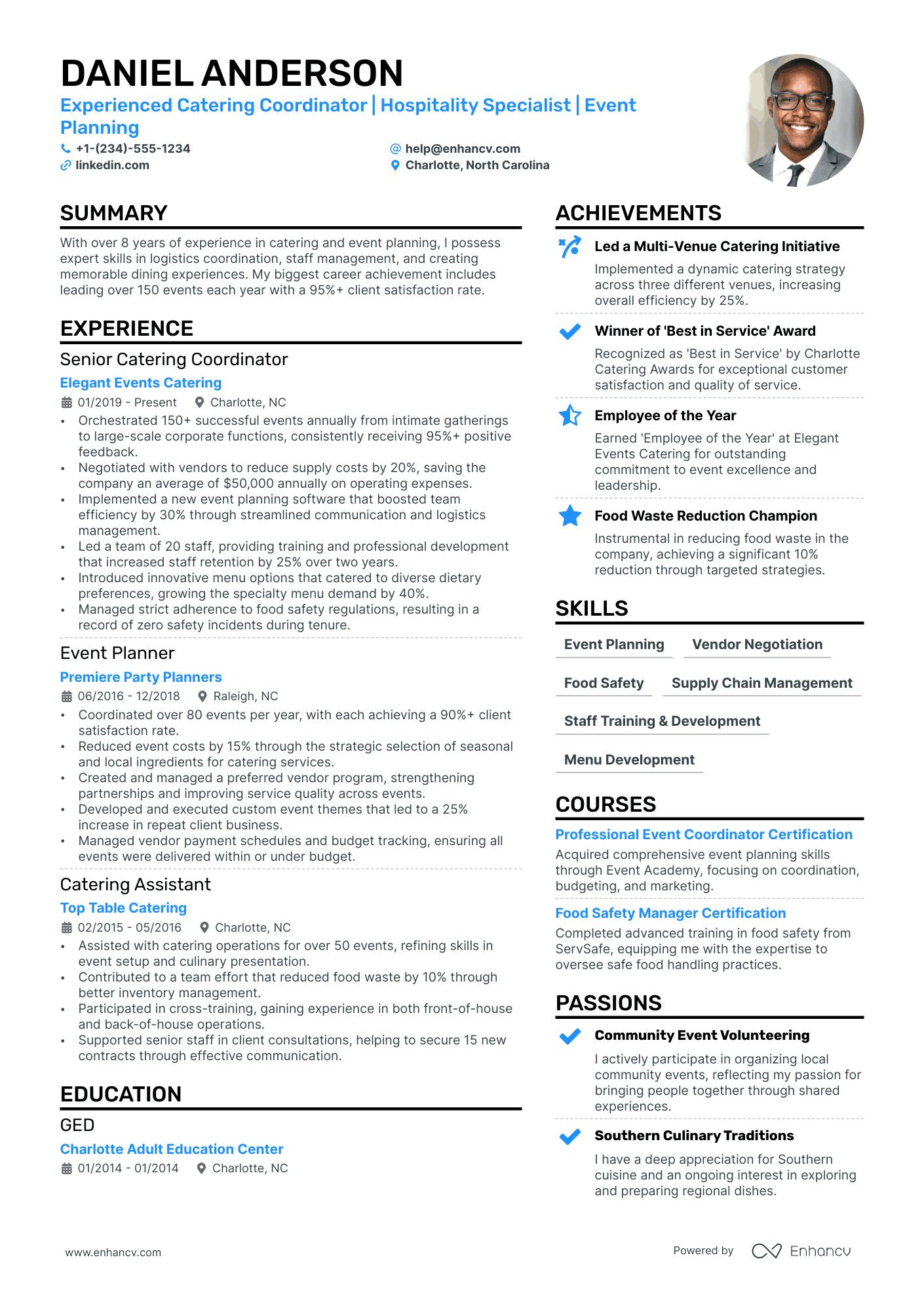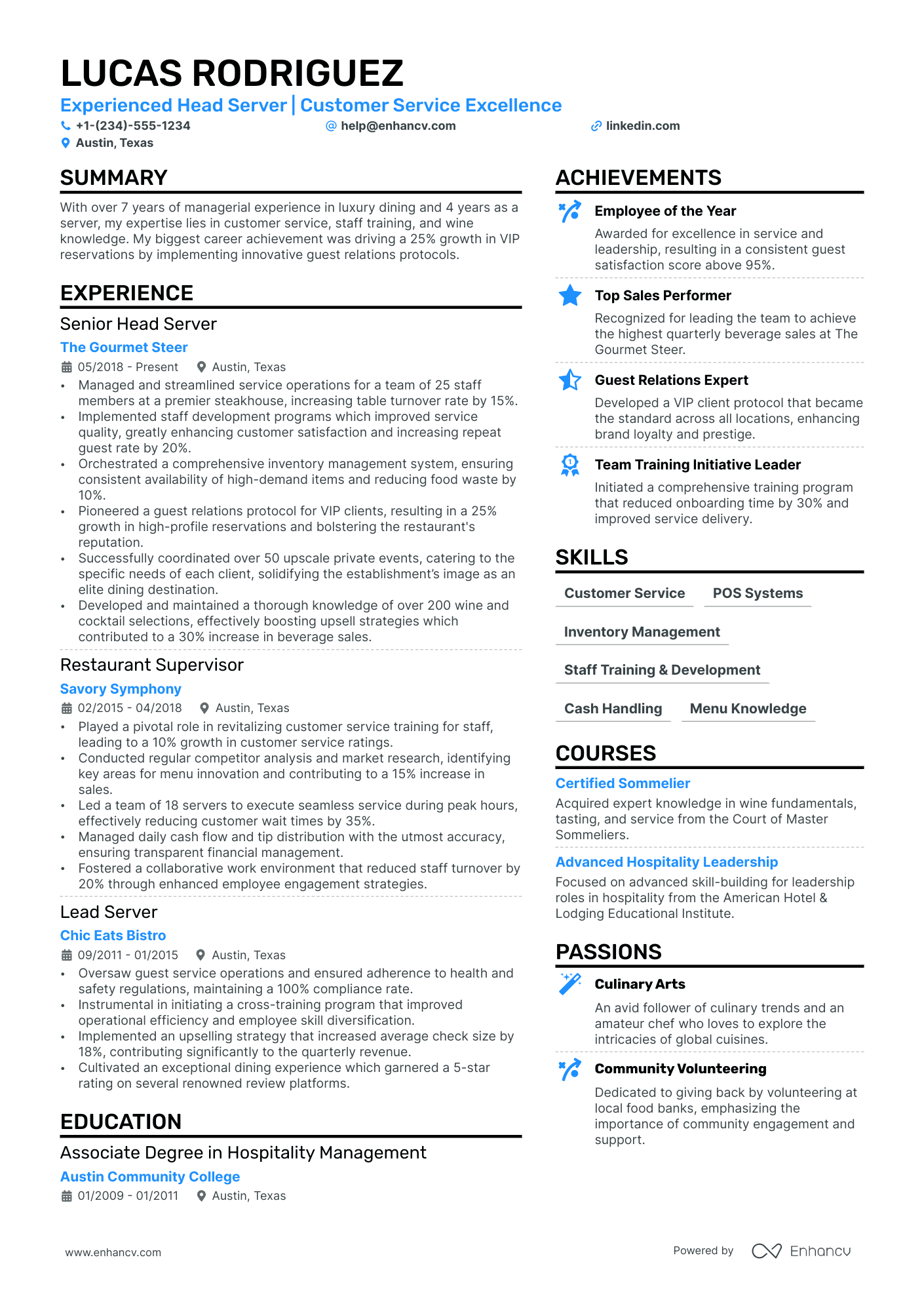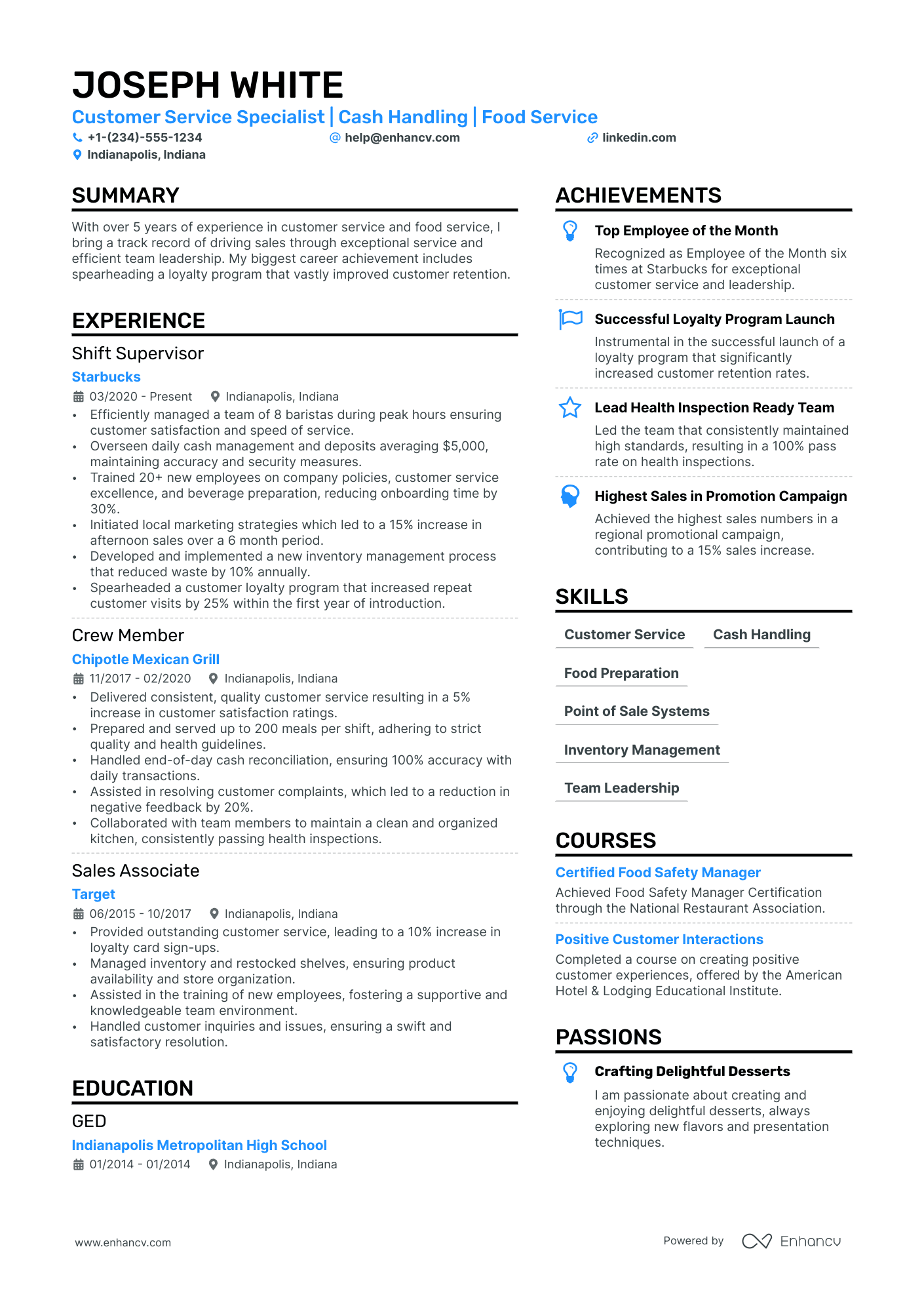Crafting the perfect resume for a server position is like preparing the ultimate dish—both require the right blend of ingredients to impress. In the fast-paced restaurant industry, where the turnover rate can be as high as 75%, standing out to potential employers is more crucial than ever. Your resume needs to reflect your experience and as well as skills and your ability to thrive in a dynamic and sometimes unpredictable environment.
Just like a good server knows their menu inside and out, learning how to write a resume is about showcasing your familiarity with the key components of the job—whether that's customer service, multitasking, or wine knowledge. In this guide, we’ll show you how to write a resume that presents your experience in a way that captures the attention of hiring managers and positions you as the perfect candidate.
Key takeaways
- Use the reverse chronological format to emphasize your work experience and career progression in fast-paced restaurant environments.
- Keep the resume layout clean with 0.5 to 1-inch margins, professional fonts, and minimal accent colors for a polished appearance.
- A resume header should include your contact details, a professional email, and optionally a LinkedIn profile, avoiding photos unless requested.
- Quantify your experience by including numbers, such as tables served per shift or increases in tips, to underline your impact in previous roles.
- For those without experience, list transferable skills like multitasking, communication, and customer service, and include volunteer work to demonstrate your dedication.
- Hard skills like POS system proficiency and food handling should be listed in a dedicated section, while soft skills like teamwork should be illustrated through past roles.
- A strong resume summary should mention years of experience, unique talents, relevant certifications, and your enthusiasm for creating a positive dining experience.
Before we get too deep into the details of crafting an ideal resume, let’s glance at a sample resume for a server.
Server resume sample
Below is an editable template resume aimed at food servers.
Shawna Flanagan
Omaha, NE
[Email Address] | [Phone Number] | [LinkedIn Profile]
Summary
Dedicated and experienced server with over three years of experience in fine dining and casual restaurant environments. Proven ability to provide exceptional customer service, maintain a clean and organized work area, and work efficiently under pressure. Skilled in bartending, tableside cooking, and wine service. Strong communicator with excellent verbal and written skills, committed to creating memorable dining experiences.
Experience
Food server and Bartender
Omaha Fine Dining, Omaha, NE
June 2021 – Present
- Deliver fast, friendly, and professional service, enhancing guest satisfaction and loyalty.
- Communicate effectively with kitchen staff to ensure timely and accurate delivery of orders.
- Assist with tableside cooking demonstrations and provided wine service to elevate guest experiences.
Food server
The Omaha Grill, Omaha, NE
January 2019 – May 2021
- Memorized menu items and specials to make informed recommendations and upsell to guests.
- Maintained cleanliness and organization of assigned stations, adhering to health and safety standards.
- Collaborated with the kitchen team to ensure smooth communication and timely order fulfillment.
Education
High School Diploma
Central High School, Omaha, NE
Graduated: May 2018
Certifications
- ServSafe Food Handler Certification
- TIPS (Training for Intervention ProcedureS) Certification
- Alcohol Awareness Training Certification
Skills
- Customer service excellence
- Multitasking and time management
- Bartending and mixology
- Tableside cooking techniques
- Wine knowledge and pairing
- Effective communication and teamwork
- Station cleanliness and organization
Languages
- English (Native)
- Spanish (Conversational)
The first thing to consider when approaching your application is the resume format.
How to format a server resume
Designing a clear and professional resume layout is key to capturing the attention of hiring managers in the restaurant industry when applying for a server position. This section will provide you with best practices for crafting a resume tailored to server roles, helping you meet industry expectations and demonstrate your relevant skills and experience effectively.
Be aware of location-based layout differences – Canadian resumes, for instance, might differ in format.
Accepted resume format
Reverse chronological format is highly recommended for server roles, emphasizing your work experience and career progression, which is essential for showcasing your ability to handle a fast-paced environment and deliver excellent customer service.
Resume design
- Keep resume margins between 0.5 to 1 inch to ensure readability.
- Use professional colors, primarily black and white, with minimal use of accent colors for headings to maintain a clean appearance.
- Choose clean, professional resume fonts like Arial, Lato, or Rubik, sized 10 to 12 points.
- Consider a double-column layout to maintain clarity and ease of reading, especially important when listing specific skills and certifications.
- Aim for a one-page resume, but two pages are acceptable if you have extensive experience relevant to food service.
- Use thin resume lines sparingly to separate sections and enhance readability without cluttering the layout.
- Avoid using icons on your resume unless they’re simple and add clarity, as they can distract from the content if overused.
Resume header
- In your resume header, add your contact information, including your city and state.
- Provide a professional email address and LinkedIn profile if relevant, which can highlight any additional training or certifications you’ve obtained in the food service industry.
- Generally, avoid including a photo unless explicitly requested or relevant to the restaurant’s brand or culture.
- Write a concise resume headline that summarizes your professional identity and underlines your experience and customer service skills.
File formatting
Save your resume as a PDF to preserve formatting. Use a clear naming convention like “FirstNameLastNameserver_Resume.pdf” to make your file easily identifiable to hiring managers.
If you’re wondering what to put on a resume for a server, here are the key resume sections we’ll discuss next:
- Summary
- Experience
- Education
- Certifications
- Skills
- Additional sections
These guidelines will help you decide what to put on a resume, ensuring it not only presents your qualifications effectively but also aligns with the specific needs of restaurant hiring managers, demonstrating your readiness and suitability for a server position.
PRO TIP
There’s a lot of unnecessary worry about ATS (Applicant Tracking Systems) among job seekers. Our research shows that using different fonts, colors, columns, or even the length of your resume does NOT hinder ATS from reading it correctly.
What truly matters is using an ATS-friendly format by matching your resume’s language to the job description and ensuring that your dates and bullet points are properly formatted, as these can affect how your resume is processed. Remember, not all restaurants use ATS, so focus on creating a clear and readable resume rather than overloading it with keywords.
Already have a resume? See how well it aligns with what restaurants are looking for by using our free resume checker!
Is your resume good enough?
Drop your resume here or choose a file. PDF & DOCX only. Max 2MB file size.
Now that we’ve emphasized the importance of making your resume clear and tailored to a server position, let’s delve deeper into the writing process, beginning with the experience section.
How to write your server resume experience
Your experience section captures your journey in the hospitality industry. While large restaurant chains might not require prior experience due to comprehensive training programs, featuring your experience is vital if you aim to advance in food service or specialize in areas like fine dining.
For major restaurant chains, hiring managers and ATS quickly scan for pertinent experience. In more specialized or boutique settings, presenting your experience prominently underscores your practical skills and enthusiasm for high-quality service.
When constructing this section, ensure it’s concise and uses action verbs and vivid adjectives to make each bullet point clear and engaging.
Here’s what to include:
- Job title and restaurant name
- Location and dates of employment
- Key responsibilities and achievements
Additionally, it's important to avoid listing irrelevant work experience on a resume, as it can detract from your relevant qualifications and skills in food service. Focus on experiences that demonstrate your capability and commitment to the food service industry.
How to tailor your work experience effectively
Just as the perfect ingredients to create a customer's favorite dish need to be chosen, you need to customize your experience to match the job description of the position you're applying for. This involves identifying keywords and skills highlighted in the job listing and ensuring your work history emphasizes these elements. By doing this, you prove that you possess the precise qualities they seek.
Resume tailoring is crucial from the recruiter's perspective for several reasons:
- Increases relevancy
- Improves candidate fit
- Enhances keyword matching
- Streamlines the hiring process
Now, let’s examine an actual job description to see how you can specifically tailor your resume to it.
Food server
Full job description:
The Food server will be responsible for providing superior service to guests in a friendly and professional manner.
Job Requirements:
- Provide fast, friendly, professional, and responsive customer service to restaurant guests, staff, and the culinary production team.
- Make eye contact, smile, greet and welcome each guest seated in the assigned station.
- Be familiar with all food and beverage items on the menu.
- Bartending experience is required.
- Be responsible for proper communication flow with the kitchen staff.
- Maintain and ensure the overall cleanliness of assigned stations.
- Other duties as assigned.
Education and Experience:
- High School Diploma or GED
- Previous food serving experience is required.
Additional Requirements:
- Previous fine dining food serving is preferred.
- Knowledge and a complete understanding of tableside cooking are preferred.
- Wine knowledge and experience are a plus.
- Excellent verbal and written skills.
- Food allergy knowledge is a plus.
- Ability to read, write, speak, and understand the English language.
- Must present a well-groomed appearance.
- Flexibility to work varied shifts, including weekends and holidays, with variable overtime.
- Must be able to tolerate areas containing secondary smoke, high noise levels, bright lights, and dust.
Required Work Cards
- Alcohol Certification
- Food Certification
The areas that were targeted, have been highlighted in the job ad above so you can easily refer back to them.
Let’s have a look at an ideally tailored job experience entry for a food server:
- •Delivered fast, friendly, and professional customer service to guests, maintaining a 98% satisfaction rate through attentive service and a welcoming demeanor.
- •Collaborated closely with kitchen staff to ensure timely communication and smooth delivery of orders, enhancing overall dining experience and operational efficiency.
- •Demonstrated expertise in bartending by preparing a variety of drinks according to restaurant standards, contributing to a 15% increase in beverage sales.
- •Maintained comprehensive knowledge of all food and beverage items on the menu, including wine pairings and tableside cooking techniques, to provide informed recommendations to guests.
- •Ensured cleanliness and organization of assigned stations throughout shifts, adhering to health and safety regulations and maintaining a well-groomed appearance at all times.
This work experience entry is effective because it highlights specific achievements and skills that directly align with the job requirements, such as customer satisfaction, bartending, communication with kitchen staff, and knowledge of menu items.
It also uses measurable results, like a 98% satisfaction rate and a 15% increase in beverage sales, to demonstrate the candidate's impact and relevance to the role.
How to quantify your experience on server resume
Using numbers and results on a server resume is crucial because they provide concrete evidence of your accomplishments and skills, making your experience more impactful.
Here are some specific server-related examples:
- Quantify the number of tables you managed per shift to illustrate your ability to handle a high volume of customers efficiently.
- Specify the average time it took you to deliver food and drinks to tables, underlining your speed and efficiency in service.
- Detail the amount in tips you earned on average per shift or month, showing your excellent customer service skills.
- Mention any specific upsell percentages or the increase in sales during your shifts to reflect your impact on the restaurant’s revenue.
- Include the number of times you were recognized as “Employee of the Month” or received other accolades, showcasing your commitment to exceptional service.
Since many people start their careers as food servers, it's helpful to explore some tips on how to craft your resume if you don’t have any prior experience in the role.
How do i write a server resume without any experience?
Applying for a server position can be challenging, especially if you lack direct experience in the role. Since many restaurants prefer candidates who already have some knowledge of the fast-paced environment, starting at a larger chain that offers training might be a smart move.
If you're committed to building a career in food service, consider volunteering at local events or helping out at smaller establishments to show your eagerness to learn and grow beyond just the basics.
Start where you are. Use what you have. Do what you can.
Arthur Ashe, American professional tennis player and a three-time Grand Slam champion.
To help your resume stand out, consider doing the following:
- List transferable skills such as customer service, communication, multitasking, and teamwork that are crucial for a server position.
- Showcase any unpaid experience, such as volunteering at events or internships, to demonstrate your willingness to gain practical experience.
- Add any relevant certifications, such as food safety or alcohol service, to prove your commitment to meeting industry standards.
- Mention relevant coursework from school or training programs that align with the skills needed for a food server job.
- Include any school clubs, sports teams, or group activities where you displayed teamwork, leadership, or organization skills.
- Craft an objective statement at the top of your application.
PRO TIP
Use a more effective resume format:
- The functional format focuses on skills and abilities rather than chronological work experience, ideal for those with limited job history or changing careers.
- The hybrid format combines elements of both the chronological and functional formats, highlighting relevant skills and achievements while also providing a timeline of work experience.
Objectives on your resume: what you need to know
Including an objective on your resume can be a great way to quickly convey your goals and enthusiasm for the position.
Here are a couple of tips on writing an effective resume objective:
- Make sure your objective clearly states the role you’re applying for and how you aim to contribute to the team. Avoid vague statements and tailor your objective to the food service industry.
- Use your objective to illustrate the skills and experiences that make you a great fit for a server position, such as strong customer service abilities, multitasking, and teamwork.
Check out this example:
Now that you've crafted your work experience entries, let's focus on effectively listing your skills on your food server resume.
How to list your hard and soft skills on your resume
Skills on a server resume are crucial because they highlight your core competencies, demonstrating to employers that you have the necessary abilities to excel in a fast-paced, customer-focused environment. Core competencies like multitasking, customer service, and knowledge of food safety are essential to showcase your qualifications for the role.
Hard skills (or technical skills) are specific, teachable abilities such as POS system proficiency, bartending, or knowledge of food handling protocols. These should have a dedicated skills section on the resume to clearly display your technical expertise.
Here are the top hard skills employers are looking for in a server.
Best hard skills for your server resume
- POS systems (e.g., Toast, Square)
- OpenTable
- Microsoft Excel
- Google Sheets
- TouchBistro
- Aloha POS
- Breadcrumb POS
- Micros POS
- Poynt
- HotSchedules
- Orderman
- Resy
- Table Management Software
- Kitchen Display Systems (KDS)
- Digital Menu Boards
- Revel Systems
- Clover POS
- Lavu POS
- QuickBooks for inventory
- Customer Relationship Management (CRM) software
Soft skills are interpersonal or behavioral skills like communication, teamwork, and adaptability. Rather than listing these separately, soft skills are best dispersed throughout your resume in the experience section— use examples to show how you’ve applied them in past roles.
Below are some of the most common soft skills that recruiters have a weakness for.
Best soft skills for your server resume
- Communication
- Multitasking
- Teamwork
- Time management
- Problem-solving
- Adaptability
- Attention to detail
- Customer service
- Conflict resolution
- Patience
- Resilience
- Active listening
- Reliability
- Empathy
- Interpersonal skills
- Positive attitude
- Diligence
Now with your skillset properly on display, let’s examine the education element of your next resume.
How to list your certifications and education on your resume
Having an education section on a food server resume is important because it demonstrates a commitment to learning and development, even if the role doesn’t require a formal degree. Education can set you apart, especially if you’ve completed relevant training or certifications in hospitality, food safety, or customer service, showing that you’re prepared for the responsibilities of the job.
Elements of a successful education entry:
- Name of the school or training program
- Degrees, diplomas, or certifications earned (include your GED or high school diploma if it's your highest level of education)
- Dates attended
- Relevant coursework (optional)
- GPA (optional, if 3.5 or higher)
Below is an education section tailored to the job description provided earlier.
- •Relevant Coursework: Food and Beverage Operations Management, Principles of Customer Service, Introduction to Bartending and Mixology, Wine and Beverage Knowledge, Culinary Arts and Kitchen Communication, Food Safety and Sanitation, Allergy Awareness in Food Service.
This education entry is effective because it’s tailored to the job requirements by highlighting relevant coursework, such as food and beverage operations, bartending, wine knowledge, and customer service, which directly align with the skills needed for the server position.
Including the high GPA demonstrates academic achievement and a strong work ethic, making the candidate more appealing.
Key elements of listing a certificate:
- Certificate name
- Issuing organization
- Date of certification (and expiration date, if applicable)
Should certificates have their own section?
When putting certifications on your resume, they can either have a dedicated section (especially if they're crucial to the job, like food safety or alcohol handling certifications) or be incorporated within the Education section if you don’t have so many.
However, for a server resume, it's generally recommended to create a separate Certifications section to ensure these qualifications stand out to hiring managers.
Here are the top five certifications for servers.
Best certifications for your server resume
With your education thoroughly explored, let's move on to crafting a strong resume summary that presents your key strengths as a food server.
How to write your server resume summary
Your resume profile is a great way to set yourself apart, especially if you're aiming for higher-level food service roles like head server, banquet captain, or shift leader. It’s a quick opportunity to convey your experience, passion, and key skills to hiring managers, offering them a glimpse of what you can bring to their team.
Optimize your resume summary and objective for ATS
Drop your resume here or choose a file.
PDF & DOCX only. Max 2MB file size.
Elements of a strong resume summary for a server:
- Mention how many years you’ve worked in the food service industry or specific roles you've held (e.g., fine dining server, banquet server).
- Highlight unique talents, such as tableside service, wine knowledge, or upselling menu items.
- Include any relevant certifications, like food safety or alcohol service certifications.
- Show enthusiasm for the role, whether it’s your love for creating a positive dining experience or your ability to handle a high-volume environment with ease.
- State what you’re looking for next in your career and how you can contribute to the restaurant or team.
Tailoring your resume summary to the specific server job you’re applying for is key. Incorporate relevant keywords from the job posting to grab the employer’s attention.
Below is a targeted summary from an applicant for the previous job ad.
This summary is effective because it quantifies achievements with a specific metric (95% customer satisfaction rating), demonstrating measurable success. It also highlights key skills and experiences directly relevant to the job, such as bartending, teamwork, and flexibility, aligning with the employer's needs.
Lastly, it conveys a professional and personable tone, underlining a well-rounded candidate who can deliver exceptional service in high-pressure environments.
Once you’ve written your summary, you may find that your resume could benefit from a few additional sections to give it that final polish and boost your chances of landing the job.
Additional sections for a server resume
Including additional sections on your server resume is a great way to enhance your application, especially if you have limited direct experience. These sections can shine a light on a well-rounded skill set and display your commitment to the food service industry.
Here are some to choose from:
- Highlight specific achievements, such as "Employee of the Month" awards or high customer satisfaction ratings, to showcase your contributions in previous server roles.
- Include any volunteer work at food-related events, charity dinners, or community fundraisers to demonstrate your passion for the food service industry and community involvement.
- List any foreign languages you speak fluently, especially if applying to a restaurant with a diverse clientele, to enhance your ability to serve a wider range of guests.
- Mention food-related hobbies or interests, such as cooking, food blogging, or exploring different cuisines, to show your enthusiasm and personal connection to the dining industry.
In conclusion
Crafting the perfect server resume is all about blending your skills, experience, and passion to stand out in the competitive restaurant industry. By following these tips and tailoring your resume to each job, you'll be well on your way to landing a position that lets you shine and thrive in a fast-paced, customer-focused environment.
